05 Dec 14 | Bahrain, Middle East and North Africa, News and features
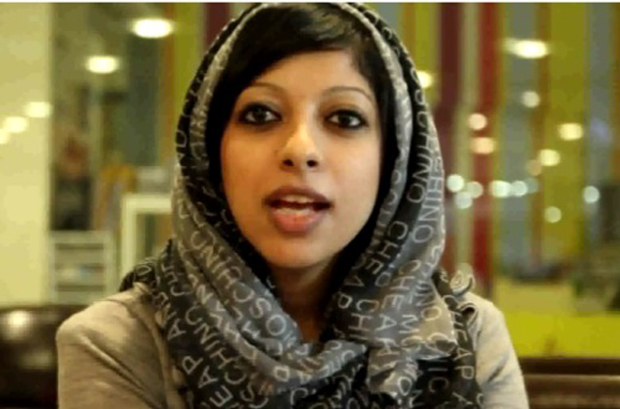
Bahraini human rights activist Zainab Al-Khawaja has been sentenced to three years in prison for “insulting the king”.
The verdict was handed down by a Manama court on Thursday, and also included a fine of 3,000 Bahraini Dinar (£5,000). She was on trial for tearing up a photo of King Hamad bin Isa Al-Khalifa at an October court date where she faced charges connected to previous rights campaigning. This comes only days after she gave birth to her second child.
The Al-Khawaja family have been heavily involved in Bahrain’s pro-democracy movement, and have been continuously targeted by authorities in the constitutional monarchy.
Al-Khawaja’s father Abdulhadi Al-Khawaja has been serving a life sentence since 2011 for the role he played in the country’s ongoing protest movement which started that year. Her sister Maryam Al-Khawaja boycotted the recent court hearing which saw her sentenced to one year in prison on what is widely acknowledged to be trumped up charges.
This article was posted on 5 Dec 2014 at indexoncensorship.org
04 Dec 14 | Academic Freedom, Europe and Central Asia, News and features, United Kingdom
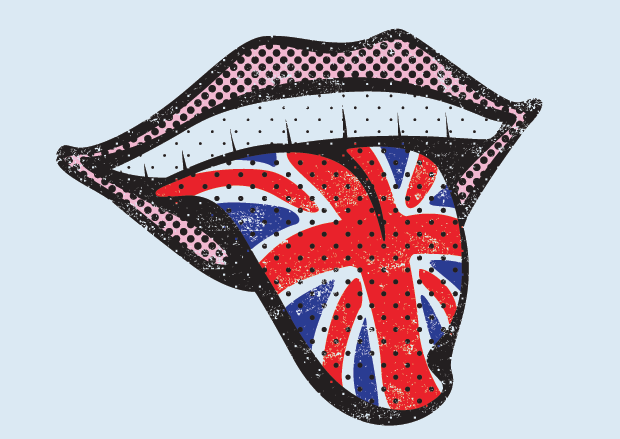
(Illustration: Shutterstock)
Who decides what is acceptable behaviour? And what is not? What is mainstream and what is radical? Who can speak and who must be silent?
At the moment, British authorities have found themselves engaged in a frenzy of defining what is acceptable and what is not, well beyond the bounds of the law courts. The government’s new counter terror bill has put the onus on public bodies to prevent individuals from becoming radicalised. The measure is clearly aimed at university campuses, which have come under increased scrutiny due to the unchecked presence of organisations such as Hizb Ut Tahrir, a group that has been calling for the rejection of secular democracy in favour of an Islamic Caliphate long before it was popular.
There is no legal sanction for failure to perform this duty, but the vagueness of the proposed law should worry everyone: there is no attempt to define what “radicalism” might mean. In the days before the UK took Islamism seriously, animal rights radicals were seen as a threat to peace. Before that, Irish republicans, and so on. As recent revelations on police surveillance have shown, everyone from activists to comedians to bereaved mothers can be cast as potential enemies of the state.
A recent example should give us pause for thought. Former English Defence League leader Tommy Robinson spoke at Oxford Union on 26 November. Robinson, currently on licenced release from prison, claimed at the beginning of the talk that he had been warned by police that there were certain things he could not say, lest he find himself back behind bars. Not, apparently, issues that could, for example, have constituted contempt of court, or the other limitations most of British society accepts. Merely opinions.
This is bad enough, but with the new counter-terror measures, could university authorities have put pressure on the union not to host their speaker of choice at all? (You may say the union is independent of the university, but it still has the power to sanction students).
What does this matter to you? You are not Tommy Robinson, and you may not even think he should be allowed to speak at the Oxford Union, or anywhere. You believe Tommy Robinson is a bigot, and plain wrong, so what’s the problem?
But think for a moment.
You’re a good person, aren’t you? I mean, at least you try to be a good person, I’m sure. You’d never throw your sandwich wrapper out of the car window. You certainly wouldn’t steal, or cheat at board games.
And you’re definitely not a bigot. You might, at certain times, find yourself applying certain stereotypes to the people you see around yourself, but your internal Jiminy Cricket, or whatever Disney avatar keeps you in line, will soon correct that. You might every so often laugh at jokes about people of other races or religions, but that’s because you understand the context. You can laugh at these things precisely because you are not bigoted: you are laughing at racism, not with it.
You might, occasionally, get frustrated at the apparently new-fangled language of online social justice activists, but you realise this is probably your fault more than theirs. You’re all right.
What if you’re not, though? What if you woke up one day, the world had tilted 180 degrees, it was summer when it was supposed to be snowing, and you were all wrong? About everything. Puppies are there to be poked, pensioners exist solely to be mugged by those younger and fitter than them, and overt, aggressive racism is not just condoned but encouraged.
This is not to suggest a moral equivalence between racism and anti-racism, or political correctness and bigotry. Because there is none. Not being a bigot is clearly better than being a bigot.
But it is a useful, simple thought experiment to carry out whenever one is tempted to excuse censorship, or even support it: what if my apparently good, apparently sensible positions were the one seen as utterly beyond the pale, and those of the person who is now being censored were the ones that held sway?
It is perhaps a refusal to recognise this idea that leads to the often-used phrase, “this isn’t a free speech issue”. Shutting down a debate on a university campus? Not a free speech issue, but about safe spaces. Calling for a television programme to be cancelled? Not about free speech, but about appropriate channels for expression.
Anti-censorship campaigners are often portrayed as “free speech fundamentalists”, but in fact, a genuine sense of doubt is what should motivate all defences of free speech. You have to ask yourself time and time again: what if I was seen as completely wrong? Would it be better to have a society where people argued against me, however vehemently and vigorously? Or would I prefer a society where the government, the police and the courts were entitled to decide what I should and should not say?
This article was posted on Dec 4, 2014 at indexoncensorship.org
03 Dec 14 | Campaigns, Kazakhstan, Statements
The injunction banning distribution and publication of ADAMbol, a popular opposition magazine in Kazakhstan, is a clear violation of freedom of press and free expression.
The magazine has been accused of engaging in “extremist war propaganda” by Almaty City’s Department for Internal Policies. Some activists believe the magazine has been targeted over its coverage of Ukraine’s Maidan protests. In addition to ordering the closure of the magazine, the injunction from Almaty district court on 20 November also demands the confiscation of all printed copies of the magazine.
Cracking down on media is a well known tactic for authorities to silence dissent and stifle debate — and one Kazakhstan has made good use of in recent times. Since late 2013, over 30 media outlets have been closed in the country, over various administrative code violations or allegations of extremism.
Index calls on Kazakhstan’s authorities to end the assault on the media and respect their citizens’ right to free expression.
01 Dec 14 | Bahrain, News and features
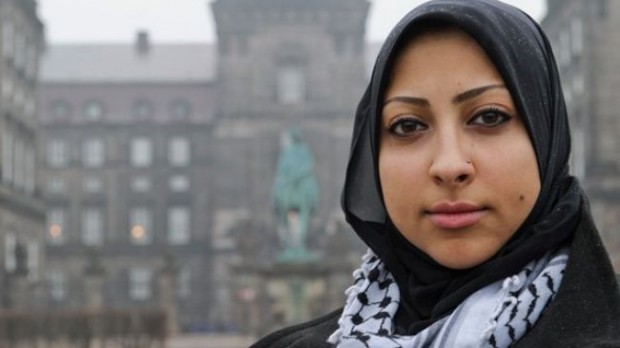
As a human rights defender, I, Maryam Al-Khawaja, Director of Advocacy at the Gulf Center for Human Rights, have decided to boycott my court hearing on the 1 December 2014. During this hearing I am due to be sentenced on trumped up charges of assaulting two policewomen at the Bahrain International Airport. (Update: Al-Khawaja was sentenced to one year imprisonment on 1 December)
The decision to boycott the court was reached based on several grounds:
- The lack of independence and due process in the Bahrain judiciary system:
It has become evidently clear that it is not possible to have a fair and independent trial in Bahraini courts as they stand. The judicial system in Bahrain is highly flawed, and is overrun with egregious human rights violations which usually start during the arrest, and continue throughout what is supposed to be a legal process. I was personally subjected to numerous human rights violations since the moment of arriving in Bahrain and until I was able to leave the country as can be read in my testimony here.
There are medical reports about the injuries I sustained during the assault I was subjected to, for which I continue to need physiotherapy. My case was sped up, and quickly turned for sentencing with complete disregard to legal procedures.
- The lack of independency and neutrality of the judge himself:
The presiding judge, Mohammed Ali Alkhalifa, in the case brought against me is a member of the ruling family, and has been himself, as well as members of his family, identified previously during my advocacy campaigns as implicated in human rights violations. This makes his presiding over the case a clear case of conflict of interest given the personal grievances he may have against me. This judge in particular, it is important to note, has been involved in the sentencing of numerous human rights defenders including Nabeel Rajab and Naji Fateel in unfair trials.
- The cooperation of the Special Investigations Unit (SIU) with the Ministry of Interior:
During my imprisonment I met with the SIU, headed by Nawaf Hamza, to submit a complaint against the three policewomen and the first lieutenant who assaulted me at the airport. The prosecutor, Mohammed Al-Hazaa, rewrote my statement in his own words, attempting to implicate me in violations, and refused to correct what he had misquoted. This resulted in my refusal to sign the papers and filing of a complaint against the prosecutor. One day before the sentencing, namely on the 30th of November 2014, and due to almost daily follow up by my lawyer, the public prosecution notified him that the complaint case had been revoked. Despite my complaint about the assault since the beginning of my arrest, it was only one day before the sentencing that my lawyer was finally able to get a statement from the public prosecution that my complaint case had been revoked, at a time when the trumped up assault charges against myself were speedily processed and turned for sentencing.
- The violation of my rights by the public prosecution:
During the interrogation I was subjected to, I was refused access to my lawyer by the prosecutor dealing with my case. During my imprisonment my lawyer was not given any visits, nor was the Danish embassy. The way that the public prosecution deals with politically motivated cases is it uses all aspects of the government to provide impunity for the perpetrators of violations.
Based on the reasons stated above, I find any and all cooperation with the court or attendance of the hearings by myself as a problematic legitimisation of an unfair and biased court. Therefore I have decided to boycott the hearings, and have asked my lawyer to do the same.
It is important to note here, if I, as a human rights defender, whose case receives international media and diplomatic attention is handled in this way; it is gravely concerning how cases not receiving attention are handled by the authorities in Bahrain.
Maryam Al-Khawaja
Director of Advocacy
Gulf Center for Human Rights
30th November 2014
This statement was originally posted on the website of the Gulf Center for Human Rights on 30 November
01 Dec 14 | Magazine

28 Nov 14 | Academic Freedom, News and features, United States
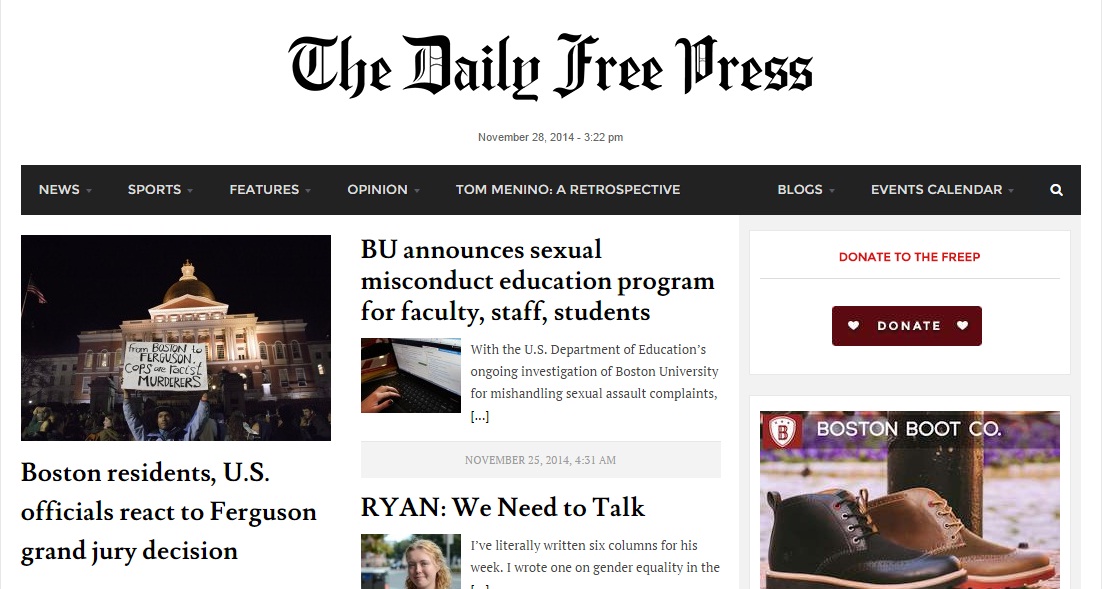
Independent student newspapers struggle in an increasingly digital world. Advertising revenue is shrinking. Budding journalists must learn how to fill the gap while maintaining news coverage free of administration censorship.
Of the more than 500 student newspapers in the US, Index spoke with two papers about their work and how they finance themselves independently.
“We really value our independent status because it allows us to be critical of the administration and be a watchdog of our university,” Kyle Plantz, editor-in-chief at Boston University’s Daily Free Press, said in an email interview.
The paper formed in 1970 after the university’s then president John Silber cut funding to two campus publications to prevent coverage of Kent State protests. As a result they merged to become the Free Press.
In recent years, Daily Free Press staff has written articles covering topics on campus such as gender neutral housing and students’ issues with the Student Activities Office, which oversees student organisations. In late 2011-2012, the paper provided extensive coverage of the arrest of two ice hockey players charged with sexual assault.
Nicole Brown, editor-in-chief at New York University’s Washington Square Press, also said her paper acts as a watchdog on the NYU administration.
“We need to be able to question our university and present information to the community,” Brown said. “We also need to be able to voice our opinions without fear of being punished for those opinions.”
The Washington Square Press keeps an open dialogue on campus through its feature, NYU Reacts. It includes students’ thoughts on topics ranging from ISIS subway threats to pro-democracy protests in Hong Kong. The paper also publishes articles on sensitive issues, such as a November 2013 piece in which NYU faculty express concern over the London campus’s rapid expansion.
Many student papers struggle to maintain steady revenue. Brown said the Washington Square Press relies on advertising, sold and managed by student staff.
“With a move toward more online content, there are more opportunities to sell ad spaces online, as well as in print,” Brown said.
For the Free Press, nearly $70,000 (£44,576.05) debt to their printers recently threatened to shutter their publication. They switched from publishing four days a week to once a week and, on 10 November, launched a crowd-sourcing campaign.
The paper surpassed their goal and raised over $82,000 in just three days, with Daily Free Press alumnus Bill O’Reilly donating $10,000 and local businessman Ernie Boch Jr. donating $50,000.
“[Reducing publication], along with cutting some other costs, we are able to continue to receive ad revenue and sustain our weekly print edition,” Plantz said. “We are assessing how we want to use [the extra funds] and what will be beneficial to our organization in the future.”
Independent newspapers must find a way to financially sustain themselves or campuses will lose reliable, student-run news.
As Plantz said, “We are one of the only outlets that allow students to have a voice, question authority, and be a place for students, faculty, staff, and the administration to come together to learn about what’s happening on campus.”
This article was originally posted 28 November on indexoncensorship.org
28 Nov 14 | ArtFreedomWales, Europe and Central Asia, News and features, United Kingdom
27 Nov 14 | Americas, Digital Freedom, Europe and Central Asia, Ireland, News and features, United Kingdom, United States
How did people organise protests before the internet? How did riots happen? How did terrorists carry out attacks? All these things definitely happened. I remember them distinctly. In the days before the world wide web, all sorts of things occurred without anyone “taking to social media” or “using sophisticated communications technology” (phones).
But current discussions are premised on the idea that the web in itself has created civil disorder and even terrorism.
In Ireland, as protests have got to the point where government ministers can barely leave the house without being confronted by citizens unhappy with proposed household water metering, commentator Chris Johns suggested that “Social media has brought more illness to Ireland than Ebola has. Anarchists, extremists and all-round loonies can find a voice and organisational structure – if only for a decent riot – amidst a political fragmentation that rewards those who shout the loudest.”
Considering there have been no recorded incidents of Ebola in Ireland, the first part of this assertion could be technically true; or we could say that social media has brought the same amount of illness to Ireland — none. As for the anarchists and loonies, well, they have always been with us, and had some success in organising before Facebook came along.
Across the Atlantic, St. Louis County Prosecuting Attorney Robert McCulloch said that “nonstop rumours on social media” had significantly hampered the investigation into the killing of Michael Brown, and contributed to his decision not to prosecute. This in the land of the First Amendment, where the justice system long ago learned to deal with hearsay.
Back over the ocean again, the UK’s Intelligence and Security Committee report into the murder of Drummer Lee Rigby by Michael Adebolajo and Michael Adebowale pointed to a Facebook message sent by Adebowale, in which he expressed a desire to kill a soldier. In spite of several failures by the intelligence services, who were long aware of Adebowale’s tendencies, Facebook faced criticism for not “flagging up” the message to the security forces. Social media to blame once again.
Why do we do this? Why must every single occurrence now have a social media angle?
Partly because everything many of us do now does have an internet angle. The web is simply part of human interaction for millions.
But for some it seems foreign. My generation is the last that will remember life before the internet.
For all that, it is still shockingly new. I’m not just saying that to make myself feel younger. Some people my age and older (“digital immigrants”, apparently, which makes me a double immigrant) have adapted reasonably well to our new environment. Some really haven’t. I have watched a QC attempt to explain the difference between a reply and a direct message on Twitter. It was as you’d expect, equal parts cute and infuriating, but it did also make one think how insanely fast we have adapted to certain technologies, and how some people are left behind.
When was the last time they changed Facebook? I honestly couldn’t say. But remember when complaining about changes to Facebook was a thing? We used to object; now we install our own mental updates and carry on, using new features and forgetting what went before. I have literally no idea what Facebook looked like when I joined it. Or Twitter for that matter.
And I, remember, am an immigrant, not a native. There are still a lot of people who don’t want to emigrate to the web, because they think it’s full of conspiracy theories and pornography. And there are some who occasionally “log on” to the internet, and then “log off” again, like an overnight work trip to Leicester.
So when something happens that involves an email, a tweet, a Facebook update or whatever, for some that is still of interest in itself.
Will this ever end? Hopefully. As time goes on, the distinction between the internet and THE INTERNET will become clearer. THE INTERNET is a culture; the place where the likes of Doge and Grumpycat come from, and all their predecessors (I still have a soft spot for Mahir “I Kiss You” Çağrı. Look it up, youngsters). The internet is simply a communications tool, like millions upon millions of tin cans joined with taut string. When we can get this a little clearer in our heads, then finding a web angle for every occasion will feel a bit silly, like blaming Bic for poison pen letters.
That is not to say that we should take the web for granted, or become blase about its use and abuse. But we must treat it as simply a part of the environment. Essentially, we have to stop thinking about things happening “on the internet”. There is no “internet freedom” — there is just freedom. There is no “internet privacy” — there is privacy. There are no “internet bullies” — there are bullies.
Put simply, we need to ban the word “internet”.
This article was published on 27 November 2014 at indexoncensorship.org
26 Nov 14 | Cyprus, Europe and Central Asia, News and features

The empty walls following the confiscation of Paola Revenioti’s work (Photo: Accept)
Gay rights NGO Accept-Cyprus LGBT has slammed police censorship, after photographs of the Greek trans activist Paola Revenioti were confiscated and its chairman charged with exhibiting obscene material in a public space. Revenioti’s photo exhibition “Diorthosi” (Correction) was staged at Nicosia Municipal Market to mark Transgender Day on 20 November.
“This incident, unfortunately, was not something that surprised me. Censorship of art still exists in our so-called ‘democratic’ society,” Revenioti told Index on Censorship.
“Although this confiscation brought the issue of censorship to the forefront, which is a good thing, it overshadowed the essence of the exhibition, kept people away from the project. This is scandalous. Art is the way every one communicates his own truth. And with this action, they have vulgarised my own truth,” she stressed.
The exhibition, part of a series of events organised the NGO, was seized following a complaint by a citizen who disagreed with the content of the photographs which depicts life through the lens of Revenioti. Police acted without informing the municipality of Nicosia, which had licensed the space of the market for this exhibition, or the organisers, Accept said.
Costa Gavrielides, president of Accept, was questioned and officially charged with “publication of lewd content” in public space. Some of the photos eventually were returned, and others that depict male nudity were withheld as evidence for the subsequent trial.
The NGO filed an official complaint regarding the incident to the national anti-discrimination body, the Office of the Ombudsperson, and will further make a formal complaint to the local authorities as well as the European Parliament and the European Commission.
The Nicosia Municipal Arts Centre condemned the action as an “overt form of censorship” that affects the artistic community of Cyprus.
“The police acted in a legal way,” was the response from police spokesperson Andreas Angelides.
This article was published on 26 November 2014 at indexoncensorship.org
25 Nov 14 | Events
Danish filmmaker Andreas Johnsen documents, over the course of four years, the high-profile court battle between world renowned artist and political activist Ai Weiwei and the Chinese authorities.
Detained for alleged tax evasion, Ai Weiwei spent 81 days in a cell with two guards watching his every move. On probation at the time of filming, and deeply affected by his ordeal, the artist continues to proclaim his innocence, despite the authorities’ unrelenting attempts to silence him. Johnsen’s candid portrait digs deep into the life and mind of a man single-handedly battling for the truth behind what has come to be known as a multi-million dollar “fake case”.
The screening will be followed by a Q&A with film-maker Andreas Johnsen, chaired by Index on Censorship’s David Heinemann
WHERE: Hackney Picturehouse, London, E8 1HE
WHEN: Thursday 27 November 2014, 20:30 followed by Q&A
TICKETS: Available Here
This event is presented as part of the Nordic Film Festival
25 Nov 14 | ArtFreedomWales, Events
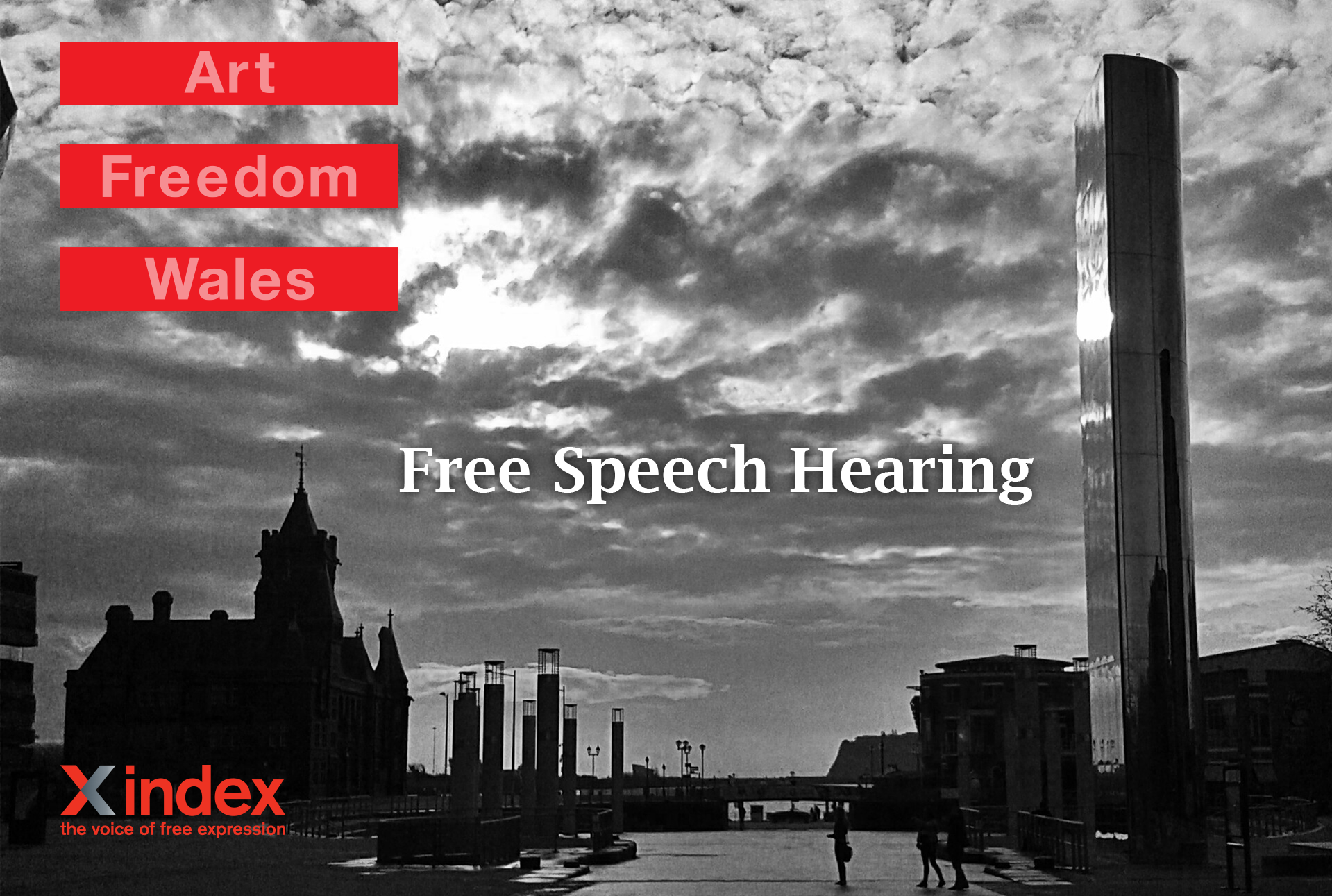
Following recent free speech hearings around the world – workshops exploring the conditions necessary for free expression to flourish – Index on Censorship is coming to Cardiff to ask the question: is Wales enjoying its right to artistic freedom of expression?
Some say yes — Wales has a proud cultural heritage, a vibrant bi-lingual arts scene and a closely-knit community. Others cite concerns — too few voices, too little access, complex linguistic battles, poor infrastructure, dwindling resource.
Join voices from across Wales to make your case, to reflect on the opportunities and obstacles and to consider whether Wales could be a world centre for artistic freedom of expression?
WHERE: Chapter Arts Centre, Cardiff
WHEN: Thursday 27 November 2014, 2.00-5.30pm
TICKETS: £5 (contribution towards costs) available here
#ArtFreedomWales
———————————————————————————————————————————————————
DRAFT PROGRAMME
2.00pm. Opening
– Freedom of Expression in Wales? Hear from the eyes of artists living in exile.
2.15pm. Evidence: Is Wales enjoying its right to artistic freedom of expression?
– Stories of opportunities, stories of obstacles – submissions invited and from the floor.
3.20pm. Taking Action: Working Groups
– Consider action around promoting Wales’ strengths and tackling Wales’ weaknesses?
4.30pm. Institutional Action: Plenary
– Reflect and deliberate on the afternoon’s discussion with a panel including
- Dai Smith (Arts Council Wales)
- John McGrath (National Theatre Wales)
- David Anderson (Museums Wales)
- Lleucu Siencyn (Literature Wales)
- Elen ap Robert (Pontio)
———————————————————————————————————————————————————
ONLINE CONVERSATIONS – #ArtFreedomWales –
Hangout 1. Artists Working In Wales (Click Here for Recap Report)
Hangout 2. Artists Working In Welsh (Click Here for Recap Report and English Translation)
Hangout 3. Young Artists In Wales
Sponsored by Arts Council of Wales and Western Power
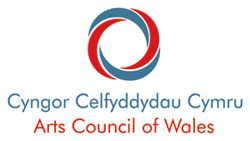

24 Nov 14 | Azerbaijan, Azerbaijan News, Azerbaijan Statements, Europe and Central Asia, News and features
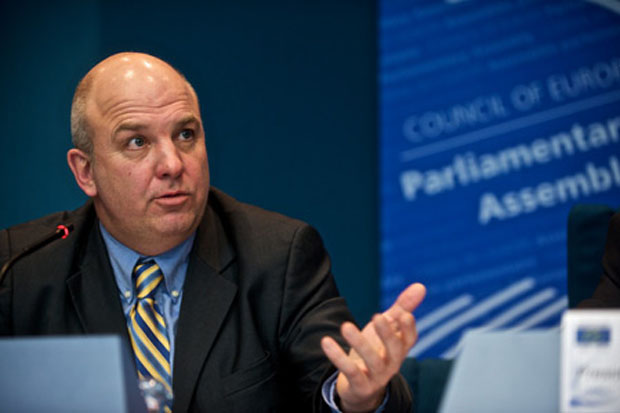
Council of Europe Commissioner for Human Rights Nils Muižnieks (Photo: Council of Europe)
I recently returned from one of the most difficult missions of my two-and-a-half year tenure as Council of Europe Commissioner for Human Rights. In late October I was in Azerbaijan, the oil-rich country in the South Caucasus, which just finished holding the rotating chairmanship of the 47-member Council of Europe. Most countries chairing the organisation, which prides itself as the continent’s guardian of human rights, democracy and the rule of law, use their time at the helm to tout their democratic credentials. Azerbaijan will go down in history as the country that carried out an unprecedented crackdown on human rights defenders during its chairmanship.
All of my partners in Azerbaijan are in jail. It was heart-wrenching to visit Leyla Yunus in pre-trial detention outside of Baku, Azerbaijan’s capital. Head of the Institute for Peace and Democracy, Leyla is Azerbaijan’s most prominent human rights activist and one of three finalists for this year’s prestigious Sakharov award, granted by the European Parliament. I do not know whether it was due to her cataracts or her emotional distress, but she cried throughout our half-hour meeting. The 58-year-old also has diabetes, Hepatitis C and kidney problems. She was in particular anguish for not having had the chance to see Arif, her husband of 26 years, for more than three months. He is also in pre-trial detention, despite having had a stroke just prior to his arrest.
The Yunus couple are among the brave activists in the region that have sought to promote dialogue with their counterparts in Armenia, a country with which Azerbaijan has been at war for the last 25 years over the Nagorno-Karabakh region, which was violently wrested from Azerbaijan as the Soviet Union collapsed. Arif and Leyla Yunus have both been charged with the crime of treason. Leyla regularly compiled lists of the country’s political prisoners for submission to international organisations. On October 24, the day I left Azerbaijan, a Baku court prolonged Leyla’s pre-trial detention for another four months.
Another difficult meeting was with Intigam Aliyev, one of Azerbaijan’s most renowned human rights lawyers, who is also in pre-trial detention for allegedly violating the restrictive provisions that make human rights work virtually impossible in the country. Until his arrest three months ago, Intigam was the co-ordinator of the Council of Europe’s legal training programme in the country. He was also legal counsel for dozens of cases against Azerbaijan before the European Court of Human Rights. When the authorities seized all of his documents, including the case files, he said he felt like the rug had been pulled from under his feet. He did not know how he could continue pushing the cases at the European Court or how he could defend himself. Again, the day I left Azerbaijan, his pre-trial detention was prolonged for another three months. When the judge announced his decision, Intigam nearly fainted.
I had a more upbeat meeting with Anar Mammadli, winner of this year’s Vaclav Havel prize, granted by the Parliamentary Assembly of the Council of Europe. Anar has already been convicted to a five-and-a-half-year prison sentence for violating the country’s cumbersome NGO laws (the formal charges were tax evasion, illegal entrepreneurship and abuse of authority). Anar was appealing his conviction and was in good spirits, despite the scant chances of success of his appeal. As one of the country’s most professional organisers of election monitoring, Anar had been harshly critical of several previous ballots in the country. Anar spends most of his time exercising and reading books on political science, philosophy and history. He wanted to know how from prison he could provide input to the Council of Europe’s efforts to assist Azerbaijan improve the legal framework for NGOs.
I also left heartened by a meeting with Rasul Jafarov, the head of an NGO called the Human Rights Club. Though he had had his pre-trial detention extended for another three months the day before I met him, Rasul was in good spirits. Rasul made a name for himself by organising a campaign called “Sing for Democracy” in the run-up to the holding of the Eurovision Song contest, which Azerbaijan hosted in 2012. He had planned to organise a new campaign called “Sports for Democracy” in the run-up to the holding of the European Games in Azerbaijan in 2015. Though he is charged with violations of the NGO law, as we bid farewell to each other, he related his plans to organise a human rights NGO among detainees.
While most of my partners are in detention, others discontinued their human rights work, left the country over the summer, or went into hiding as the crackdown spread. I visited one of the activists in hiding, Emin Huseynov, head of the Institute for Reporters’ Freedom and Safety, an NGO defending journalists in Azerbaijan’s restrictive media context. Though Emin is only 35 years old, he has very high blood pressure and an old spinal injury caused by an encounter with Azerbaijani police batons at an “unauthorised” demonstration a few years ago. Doctors who have examined him say he will not survive an Azerbaijani prison.
These are just some of the activists and journalists languishing in prison or under pressure in Azerbaijan. They are core partners for the Council of Europe – they have all attended roundtables for human rights defenders organised by my office or participated in events organised by the Parliamentary Assembly. The Council of Europe’s primary friends and partners in the country have almost all been targeted. While this pains me deeply, it also makes practical cooperation between Azerbaijan and the Council of Europe extremely difficult. The reprisals must stop. Now.
This article was originally posted on the Facebook page of the Council of Europe Commissioner for Human Rights. It is republished here with permission from the Council of Europe and the Council of Europe Office of the Commissioner for Human Rights.












